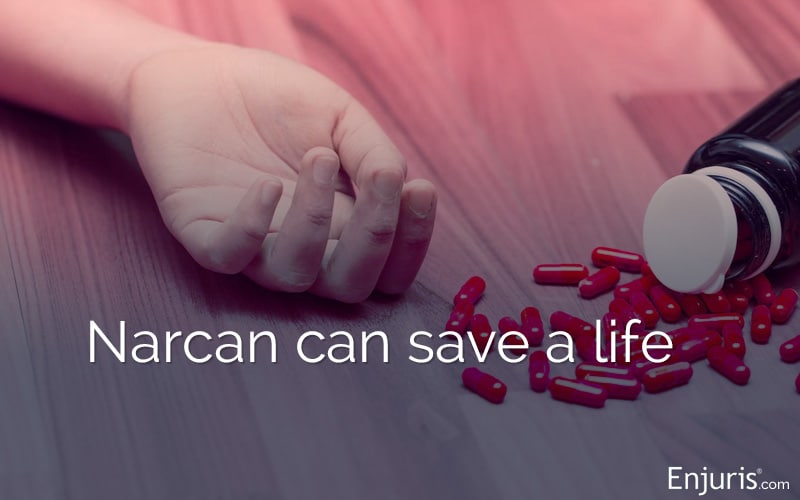
If you find someone who you believe to have overdosed, you can administer Narcan and be free from legal liability under Good Samaritan laws
No one should hesitate to administer Narcan for an overdose victim because they’re afraid of their own legal repercussions. Here’s how the Good Samaritan Law protects you.
With the unfortunate rise in opioid-related overdoses, more individuals are likely to encounter situations where they may need to assist someone who has overdosed. Knowing how the Good Samaritan Law applies, especially when it comes to administering Narcan (naloxone), can be crucial.
What is Narcan (naloxone)?
Narcan (generic: naloxone) is a medication designed to reverse opioid overdose rapidly. It can restore normal breathing in someone who has overdosed on fentanyl, heroin, hydrocodone, or other opioids when administered either via nasal spray or an injection.
However, a Narcan injection isn’t a “one-and-done” situation; the medication is only effective temporarily. It’s essential that the person administering the drug call 911 immediately and seek emergency care for the overdose patient.
The Good Samaritan Law in the context of drug overdose
The essence of the Good Samaritan Law is to protect individuals from legal consequences when they voluntarily offer aid to those in distress. Their actions must be in good faith and reasonable under the circumstances.
The important part to remember about being a Good Samaritan is that the laws won’t protect you if your actions were reckless or careless in any way. You can still be sued for civil or criminal damages if your help actually made the situation worse or injured the person further. This would fall under tort or criminal law, depending on the severity of the actions.
If you were committing a drug-related crime (or any crime) at the time when you administered Narcan to someone during an overdose, you could be relieved of legal responsibility for their health as a result of the incident, but you would still be liable for your own crimes. In other words, if you’re in possession of an illegal drug, that doesn’t get “erased” by the law just because you did a good thing and helped someone else.
When might you need to administer Narcan?
Hypothetical #1: You come across someone in a public place who appears to be unconscious and displays signs of an opioid overdose (slow, erratic, or no breathing; blue or purple skin tone; and non-responsive). You administer Narcan in an attempt to save them.
Hypothetical #2: You’re at a house party. Someone overdoses and you attempt to give them Narcan, even if you're unsure of the exact drug they consumed.
In both scenarios, the Good Samaritan Law generally shields you from legal repercussions if you acted reasonably and in good faith, even if there were unintended consequences.
Police officers, EMTs, and first responders: Are they covered?
While the Good Samaritan Law primarily aims to protect untrained individuals, professionals such as police officers, EMTs, and first responders operate under slightly different guidelines.
Generally, when acting in their professional capacity, first responders have immunity from civil liabilities when administering emergency aid, including Narcan.
Professional duty
These professionals are trained to respond to emergencies. They have a duty to assist and have separate legal standards that apply to their actions.
While they're protected under Good Samaritan laws, their professional status and training might subject them to a higher standard of care than laypersons.
Good faith
If a police officer or EMT administers Narcan believing someone has overdosed on opioids, but it turns out the person had a different medical issue, they're generally protected legally, provided they acted in good faith and followed their training.
What to do if you encounter someone who has overdosed
- Stay calm and assess. Look for signs of an overdose like shallow breathing, unconsciousness, and blue/purple skin tone.
- Call 911. Always notify professionals. They can provide additional assistance and ensure the individual receives further care.
- Administer Narcan if available. If you have Narcan on hand and believe the individual has overdosed on opioids, administer it according to the instructions.
- Stay with the individual. Once you've given Narcan, stay with the person until help arrives. They may need further doses or medical attention.
If you improperly administer the medication or if the individual wasn't actually having an opioid overdose, there could be medical risks. However, Narcan is considered safe, with no potential for misuse or causing harm if given mistakenly.
Protecting your legal interests while being a Good Samaritan
While your primary concern is likely the safety and well-being of the individual, here are steps to ensure you're also safeguarding your legal interests:
- Act in good faith. Always act with the genuine intention of helping.
- Follow instructions. If you have Narcan, ensure you follow the guidelines for administering it.
- Avoid going beyond your knowledge. Only take actions you're confident in. For instance, if you don't know CPR, don't attempt it. You could do more harm. If you're unsure about how to assist, wait for professionals. Sometimes, the best help is ensuring the person is safe and calling for emergency services.
- Document the incident. After the event, write down what happened, the actions you took, and why. This can be valuable if there are any legal questions later on. You should also note if there were witnesses to the Narcan administration or to the person’s apparent overdose. Take their names and contact information if possible.
While the opioid epidemic has unfortunately placed more individuals in situations where they might need to act, it's crucial to remember the essence of the Good Samaritan Law, which is to protect a person who genuinely and reasonably tries to help. By understanding the nuances of the law and always acting in good faith, you can potentially save a life without jeopardizing your legal standing.
